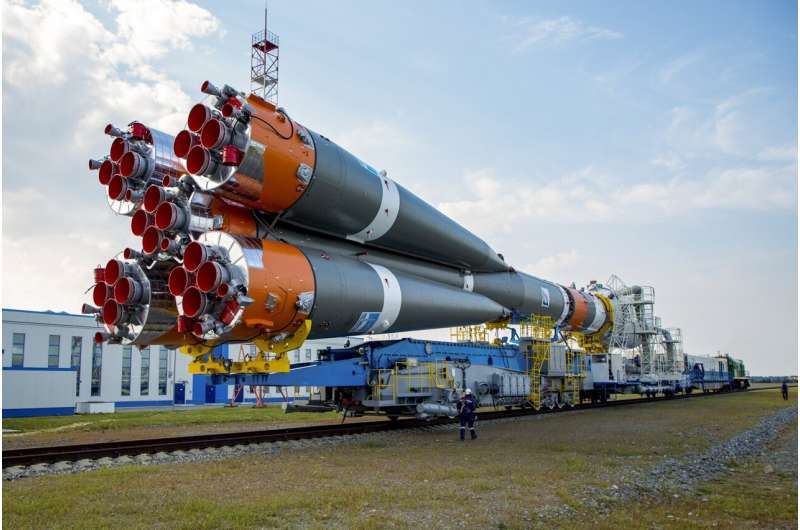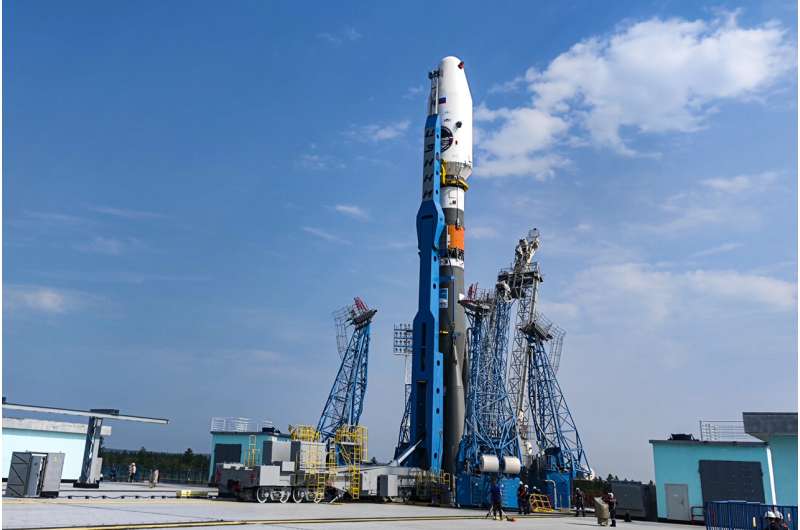This article has been reviewed according to Science X's editorial process and policies. Editors have highlighted the following attributes while ensuring the content's credibility:
fact-checked
reputable news agency
proofread
Russia is to launch its first mission to the moon in almost 50 years

Russia is scheduled to launch its first mission to the moon in nearly 50 years on Friday, pitting it in a space race with India which is also aiming to land a lunar craft this month.
The launch of the Luna-25 craft to the moon will be Russia's first since 1976 when it was part of the Soviet Union and will be conducted without assistance from the European Space Agency, which ended cooperation with Russia after its invasion of Ukraine.
The Russian lunar lander is expected to reach the moon on Aug. 23, about the same day as an Indian craft which was launched on July 14.
Both countries' modules are headed for the lunar south pole, an area where no spacecraft has landed smoothly. Only three governments have managed successful moon landings: the Soviet Union, the United States and China.
Roscosmos, Russia's space agency, said it wants to show Russia "is a state capable of delivering a payload to the moon," and "ensure Russia's guaranteed access to the moon's surface."
"Study of the moon is not the goal," said Vitaly Egorov, a popular Russian space analyst. "The goal is political competition between two superpowers—China and the U.S.—and a number of other countries which also want to claim the title of space superpower."
Sanctions imposed on Russia after it invaded Ukraine make it harder for it to access Western technology, impacting its space program. The Luna-25 was initially meant to carry a small moon rover but that idea was abandoned to reduce the weight of the craft for improved reliability, analysts say.
"Foreign electronics are lighter, domestic electronics are heavier," Egorov said. "While scientists might have the task of studying lunar water, for Roscosmos the main task is simply to land on the moon. To recover lost Soviet expertise and learn how to perform this task in a new era."

The Luna-25 will be launched from the Vostochny Cosmodrome in Russia's Far East. The spaceport is a pet project of Russian President Vladimir Putin and is key to his efforts to make Russia a space superpower and move Russian launches from the Baikonur Cosmodrome in Kazakhstan.
It is unclear if Putin will attend the launch of the lunar lander. In 2016, he was present at the failed launch of a Soyuz rocket, after which Russian media reported he seriously rebuked officials.
A previous Indian attempt to land at the moon's south pole in 2019 ended when the lander crashed into the moon's surface.
The lunar south pole is of particular interest to scientists, who believe the permanently shadowed polar craters may contain water. The frozen water in the rocks could be transformed by future explorers into air and rocket fuel.
"The moon is largely untouched and the whole history of the moon is written on its face," said Ed Bloomer, an astronomer at Britain's Royal Observatory, Greenwich. "It is pristine and like nothing you get on Earth. It is its own laboratory."
The Luna-25 is to take samples of moon rock and dust. The samples are crucial to understanding the moon's environment ahead of building any base there, "otherwise we could be building things and having to shut them down six months later because everything has effectively been sand-blasted," Bloomer said.
© 2023 The Associated Press. All rights reserved. This material may not be published, broadcast, rewritten or redistributed without permission.




















